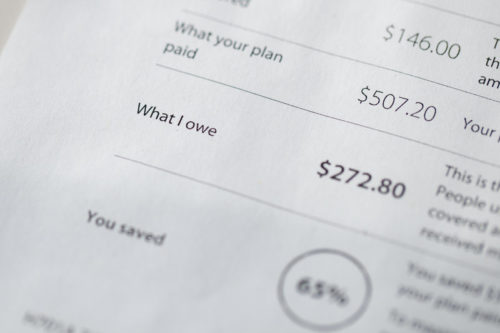For at least five years, proposals to curb surprise medical billing have hit roadblocks in the Georgia General Assembly. Health insurers and physicians have been sharply split over how to fix the problem, and lawmakers have tended to line up with one side or the other.
The state Senate on Monday took a major step to end those stalemates.

The chamber unanimously passed Senate Bill 359, which sets up a process for regulating charges from out-of-network medical providers. An identical bill is working through the Georgia House as well.
The lead sponsor of the Senate measure, Chuck Hufstetler (R-Rome), said Monday on the Senate floor that medical bills are the leading reason for personal bankruptcy in Georgia. “Almost half of Americans have experienced a surprise bill,’’ he said.
The Senate and House sponsors recently injected language to ensure hospitals are included in the surprise billing legislation. But experts say there still may remain a loophole in the legislation that would allow non-network hospitals to “balance bill’’ a patient in emergency cases.
Balance billing means that when high charges remain after insurance payments are made, the patient becomes responsible for paying that balance.
Jack Hoadley, a Georgetown University health policy researcher who has reviewed the legislation here, said, “The last version I’ve seen does leave a loophole that leaves patients vulnerable to being billed by non-network hospitals if they end up in that hospital in an emergency.”
New York state, he said, had a similar loophole in its original surprise billing legislation, but fixed it last year.

The Georgia legislation, Senate Bill 359 and House Bill 888, focuses on surprise billing that occurs after elective surgery or emergency care, when the facility itself is in the patient’s insurance network but the ER physician, anesthesiologist, radiologist or pathologist is not. In such cases, the patient gets a separate, unexpected bill from that out-of-network doctor, and it can reach into the thousands of dollars.
Under the identical proposals in the two chambers, insurers would pay out-of-network physicians the same amount for a service (or a similar service) as a physician in the network would be paid. If there’s a disagreement on the payment rate, the two sides would enter an arbitration process overseen by the state Department of Insurance.
The legislation would not pertain to people covered under self-insured health plans run by large companies. But it would cover more than 2 million Georgians who have coverage that’s regulated by the state, as well as individuals in the health insurance exchange and people covered under the state employee and teachers’ health plan.
Before the 54-0 Senate vote, Minority Leader Steve Henson (D-Stone Mountain) called the proposal “an excellent piece of legislation.’’
“Surprise billing plagues our health care system and presents extraordinary burdens for many Georgians every year,” Hufstetler, an anesthetist, said in a statement. “We want patients to focus on getting well following a procedure, not worrying about whether they will face an enormous unexpected bill related to complicated network coverage.’’

Later Monday, a House panel heard state Rep. Lee Hawkins (R-Gainesville) discuss the House version but did not take a vote. Hawkins, a dentist, said the legislation’s central goal is to help patients.
He told reporters after the hearing that “this is a time that Democrats and Republicans are coming together for the common good of the patient.’’
Hawkins added that House members have offered some “good amendments’’ that the House Special Committee on Access to Quality Health Care will consider.

